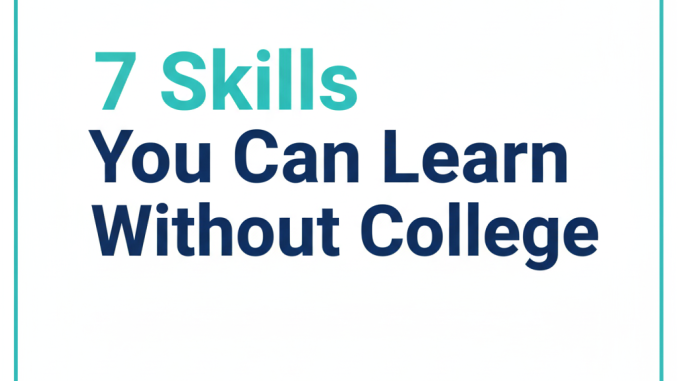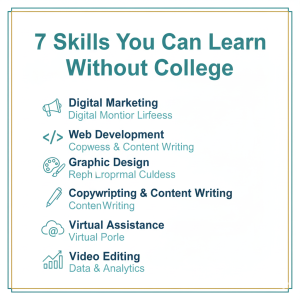
Top 7 In-Demand Skills You Can Learn Without a College Degree
You don’t need a college degree to kill it these days—honestly, that’s kind of old-school thinking now. It’s 2025, and the game’s totally changed. Employers, clients, people online—they’re not scrolling through your resume hunting for a fancy diploma. They want to see what you can actually do, period. If you’ve got hustle and you’re willing to put in the work, you can learn a bunch of high-paying, in-demand skills without ever setting foot in a traditional classroom. Seriously, skip the tuition and the ramen noodles.
Below are 7 skills that can actually put cash in your pocket, set you up for a legit career, or help you launch your own business—no college lecture halls required, just your own grind and curiosity.
-
Digital Marketing
Why it’s valuable:
Let’s be real—every business is desperate for people who can actually get them noticed online. You help companies find their crowd, boost their sales, and make their brand pop. Digital marketing is basically the engine behind every brand you see blowing up on your feed.
What to learn:
SEO (Search Engine Optimization)—so your stuff doesn’t get lost on page 12 of Google
Social media marketing (Instagram, Facebook, TikTok)—where the people are scrolling every day
Email marketing—not just spamming, but building real connections
Paid ads (Google Ads, Facebook Ads)—the “put your money where your mouth is” of the internet
How to get started:
YouTube is overflowing with tutorials, and places like Google Digital Garage and HubSpot Academy have entire free courses. Don’t just watch—try it. Promote your friend’s online thrift shop or launch a meme page for your cat. Real practice beats theory every time.
Extra tip: Digital marketing changes FAST. Trends move at the speed of TikTok. Stay curious, experiment, and never assume you know it all.
-
Web Development (Front-End / Basic / No Code)
Why it’s valuable:
As long as people need websites (so, forever), there’s always going to be a demand for folks who can build or fix them. Businesses, artists, even your dog’s fan club—they all need a web presence.
What to learn:
HTML, CSS, JavaScript basics—these are like the bread, butter, and jam of the internet
Website builders/no-code tools (Wix, Webflow, WordPress)—for when you want to make something quick and slick
Responsive design—because everyone’s glued to their phone, not their desktop
How to get started:
FreeCodeCamp and Codecademy are solid places to start, and you don’t need to pay a dime. Offer to build a website for your friend’s band or your neighbor’s bakery. Don’t overthink it—your first site will probably be kind of ugly, but you’ll learn tons.
Extra tip: No-code tools are changing the game. You don’t need to be a coding wizard to make something awesome.
-
Graphic Design & Visual Content Creation
Why it’s valuable:
We live in an age of scrolling and swiping—if your stuff looks boring, it’s invisible. Good design grabs attention and makes brands memorable. Think about how many brands you recognize just by their colors or logo.
What to learn:
Canva, Figma, Photoshop basics—these are your creative playgrounds
Design principles: color theory, typography, layout—so your stuff doesn’t look like a ransom note
Making social media graphics, flyers, digital ads—stuff people actually see
How to get started:
Try out free templates on Canva and remix them for practice. Offer to create a few Instagram posts for a local coffee shop or your cousin’s podcast. Even making birthday cards counts. The more you play, the better you get.
Extra tip: The internet is FULL of inspiration. Save stuff you like, try to copy it (for practice, not plagiarism), and figure out what makes it work.
-
Copywriting & Content Writing
Why it’s valuable:
Words sell. Seriously, almost every click, signup, or sale starts with the right words in the right order. Brands need writers for blogs, ads, emails, and websites—if you can write in a way that makes people care, you’ll never be out of work.
What to learn:
Clear writing—ditch the fluff and jargon
Persuasion techniques—subtle, not sleazy
Writing for blogs, newsletters, ads, and websites
Basic SEO—so your writing gets seen, not buried
How to get started:
Check out blogs about copywriting (Copyhackers, anyone?), read a few books, and then write like crazy. Guest posts, your own blog, LinkedIn updates, even reviews on Amazon. The more you write, the sharper you get.
Extra tip: Good writers are good readers. Pay attention to ads, emails, or posts that make you stop scrolling and ask yourself why they work.
-
Virtual Assistance / Remote Administrative Skills
Why it’s valuable:
Everyone’s swamped with emails, calendars, and a million little things nobody wants to do. Virtual assistants (VAs) are the modern-day superheroes—helping businesses, entrepreneurs, and even influencers keep their lives together, all from your own couch.
What to learn:
Email & calendar management—keeping chaos in check
Data entry, basic spreadsheet skills (Google Sheets/Excel)
Communication, time management—basically, being a people person who’s also organized
Tools like Google Workspace, Microsoft Office, Trello, Slack—stuff you’ll use everywhere
How to get started:
Offer to help someone you know—maybe your aunt’s Etsy shop or your friend’s podcast. Set up a profile on Upwork or Fiverr, and take on a few gigs. You’ll learn what clients actually need, and that’s where you’ll shine.
Extra tip: Being reliable and friendly will take you far. People hire VAs they trust, plain and simple.
-
Video Editing & Multimedia Creation
Why it’s valuable:
Video runs the internet now, especially short-form stuff—YouTube, TikTok, Instagram Reels, you name it. If you can cut, edit, and spice up a video, you’re golden.
What to learn:
Basic video editing software (DaVinci Resolve, Premiere Pro, or even iMovie)
Short-form video editing—fast cuts, cool transitions, eye-catching captions
Audio, lighting, and visual storytelling—so your videos don’t look and sound like they were filmed in a cave
How to get started:
Edit simple videos—slideshows, vlogs, or funny TikToks. Use free or cheap tools and just make stuff. Your first videos might be cringe, but you’ll get better with every upload.
Extra tip: Watch the stuff you like and try to reverse-engineer it. What makes it work? Steal like an artist (again, for practice—not to rip people off).
-
Data Skills & Basic Analytics
Why it’s valuable:
Data is everywhere. If you can make sense of numbers and spot patterns, you’re basically a wizard. Businesses, non-profits, even sports teams want people who can turn data into decisions.
What to learn:
Excel or Google Sheets—seriously, learn the shortcuts and functions
Data visualization—making charts, dashboards, reports that actually tell a story
Intro to SQL or basic database stuff—if you’re feeling adventurous
How to get started:
Check online tutorials (YouTube, DataCamp, tons of free stuff out there), and play with sample datasets. Help a local shop track their sales, or analyze a survey for a school project. Real data > made-up examples.
Extra tip: Even the basics can make you valuable. You don’t need to be a data scientist to be useful.
How to Choose the Right Skill for You
Honestly, pick something you don’t hate—ideally, something you already mess around with or find interesting. You’ll stick with it way longer if you’re not dreading it.
Think about demand and pay, too. Some skills pay more or are in higher demand depending on where you live (or if you’re going remote/online).
Don’t fall for shiny object syndrome. Focus on one skill at a time. Get decent at it, maybe even make a little cash, THEN move on to another if you want.
Start with free or cheap resources. No sense in dropping big bucks until you know it’s something you want to do.
Challenges & How to Overcome Them
Overwhelm: There are a million tools, courses, and gurus out there. Just pick one path and ignore the noise. You can always pivot later, but you’ve got to start somewhere.
Procrastination: Set a schedule. Even 20 minutes a day adds up fast. Block off time like it’s a meeting you can’t skip.
Bad resources: Not all free stuff is good—some is straight-up trash. Stick to reputable sites, check reviews, and don’t be afraid to ask around.
Portfolio panic: No experience? Make your own projects, volunteer, or do some work for friends. Everyone starts with zero. The key is to have something to show, even if it’s not paid work.
Conclusion.
You can totally build a successful, satisfying, and profitable career without setting foot in a college classroom. The world’s changing fast, and skills are the new currency. The seven skills above? They’re some of the most accessible, hottest, and bankable out there right now. Pick one, actually practice, build a portfolio—even if it’s just for yourself at first—and you’ll be surprised how quickly you can start landing gigs and making money. Forget the old rules—your future’s wide open if you’re willing to learn and adapt.



I don’t think the title of your article matches the content lol. Just kidding, mainly because I had some doubts after reading the article. https://www.binance.com/ar-BH/register?ref=UT2YTZSU
I don’t think the title of your article matches the content lol. Just kidding, mainly because I had some doubts after reading the article. https://www.binance.com/register?ref=IHJUI7TF
Your point of view caught my eye and was very interesting. Thanks. I have a question for you. https://accounts.binance.info/sl/register?ref=I3OM7SCZ
I don’t think the title of your article matches the content lol. Just kidding, mainly because I had some doubts after reading the article. https://www.binance.com/register?ref=IHJUI7TF